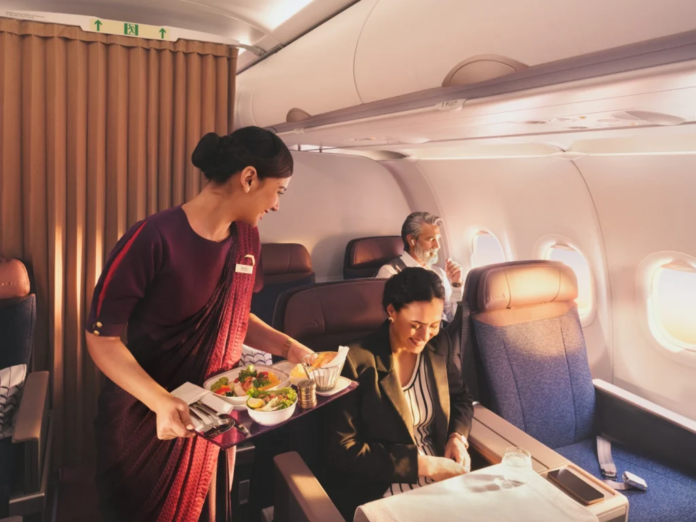Air India (AI), now under Tata ownership, has announced a major shift in its in-flight meal policy, implementing ‘Muslim meal’ (MOML) or ‘halal’ meal options for passengers on select routes, primarily Saudi Arabian destinations and the annual Haj pilgrimage. The new policy mandates pre-booked meal selections for all passengers, marking a significant shift in Air India’s service model. The decision, announced in an internal circular, has triggered a range of responses from frequent flyers and the public, especially as Air India’s merger with Vistara draws near.
Key Policy Changes: Halal Meals on Select Routes and Pre-Booking Mandate.
As per the circular circulated to Air India’s operational teams earlier this month, all in-flight meals on flights to and from Saudi Arabia and for the annual Haj pilgrimage will now be strictly halal, including certificates affirming compliance with halal preparation standards. Passengers will also be required to pre-book meals on all routes, a first for the airline known for its more flexible dining arrangements.
This decision appears in line with Air India’s efforts to streamline its operations and enhance service consistency, particularly following the airline’s merger with Tata’s Vistara. A senior AI official commented on the transition, highlighting that the pre-booking measure is aimed at reducing wastage and improving logistical efficiency, while the specified halal meal options cater to the dietary requirements of passengers on particular religious routes.
“Halal certification will be provided on all flights to Jeddah, Dammam, Riyadh, and Medina, including the dedicated Haj flights. This will ensure compliance with the religious dietary standards required by passengers on these sectors,” reads an excerpt from the circular.
Air India has traditionally offered a variety of meal options, including vegetarian, vegan, Jain, and diabetic-friendly meals, and halal meals as part of its regular in-flight service. However, the mandatory nature of pre-booking all meals on every route marks a shift, suggesting the airline is moving towards more structured service management.

Public Response and the Debate Around Halal-Only Options.
While Air India’s move is intended to enhance meal service efficiency, it has spurred mixed reactions among the public. Some frequent travelers view the decision as pragmatic, noting the importance of catering to religious dietary restrictions, especially on flights to and from Saudi Arabia where a significant number of passengers observe halal practices. For these routes, the dedicated MOML (Muslim Meal) option is seen as a service improvement for passengers who would otherwise need to confirm their dietary needs separately.
However, there has also been criticism, particularly from non-Muslim travelers who might prefer other dietary options or have specific dietary needs unrelated to halal standards. Some passengers have expressed concerns that an exclusive focus on halal meals for select flights may feel restrictive, especially if a more varied meal offering was previously available. Critics also point out that the mandatory pre-booking of meals across all routes could inconvenience passengers who may prefer the flexibility of choosing their meals on board, especially for spontaneous travelers or those with last-minute plans.
This polarized response has been compounded by social media debates, where some netizens voiced concerns over whether the airline’s halal-only policy on select routes would set a precedent for broader in-flight service limitations in the future. For Air India, addressing these concerns may require clear communication to assure passengers that the new policy is intended solely for service optimization on specific routes, rather than a broader restriction on meal variety.
Balancing Tradition with Practicality in Air India’s New Service Model.
The shift towards a more streamlined meal service is not isolated within Air India; globally, airlines are increasingly adopting structured meal management approaches to control wastage and align with evolving travel patterns. By introducing a pre-booking mandate, Air India likely aims to adopt a similar cost-efficiency model, yet the airline must carefully balance this with maintaining its longstanding commitment to diverse passenger needs.
Historically, Air India has been known for its inclusive approach to in-flight meal options, catering to a wide range of dietary preferences. The transition under Tata’s ownership may bring more structural and operational adjustments, especially as the airline moves forward with the Vistara merger, integrating the two service philosophies under one umbrella.
Air India’s internal communication emphasized the importance of reducing meal wastage and maintaining a smoother operational flow as part of its post-merger adjustments. As competition in India’s aviation sector intensifies, such efficiency measures may contribute to AI’s long-term strategy to bolster customer satisfaction and operational resilience.

A Measured Policy Shift with Room for Flexibility.
As Air India progresses through the post-merger phase with Vistara, the airline’s new meal policy underscores an effort to refine service efficiency and maintain religious dietary standards on specific routes. However, the airline may need to exercise flexibility by ensuring clear communication with passengers to mitigate any discomfort or confusion regarding the new policies.
For passengers, the decision is likely to be seen in varied lights—some viewing it as a practical alignment with religious needs, others as a restrictive shift. Ultimately, for Air India, navigating this policy change while maintaining passenger goodwill will be essential as it redefines its service model to meet evolving expectations in India’s competitive aviation landscape.

